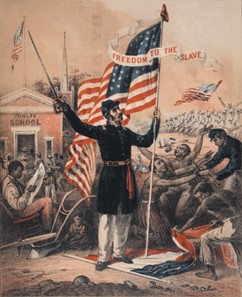
COURSES
Fall 2023 Graduate Course Descriptions
500-700 Level
SUBJECT TO CHANGE WITHOUT NOTICE! Always check the University online schedule for the latest changes.
HIS 510 - Historiography
80491 M 5:30-8:20
Teresa Walch
Development of the historical profession and perspectives on historical methodology. Selected readings by philosophers of history and practicing historians.

HIS 526 - Selected Topics in the Civil War and Reconstruction: "American Nationalism and the Second Founding"
80486 MW 2:00-3:15
Mark Elliott
This course examines the transformation of American nationalism during the Civil War and Reconstruction period. Historians have begun to view the profound changes of this period as a "Second Founding" period that remade the nation’s constitutional and national identity. Conflicting ideas about nationalism led to the Civil War and the conflict itself reshaped the ways Americans conceived of national identity. American antislavery nationalism triumphed but also morphed into new forms during Reconstruction. Confederate nationalism did not die, but transformed and survived into the next century as a variant of American identity. This course seeks to better understand how the multiplicity of nationalisms operated as a cultural force. How were they gendered and racialized? What inclusions and exclusions did they create or reinforce? What have been the lasting legacies of this period for American nationalism today? Students will examine both primary and secondary sources and conduct their own historical research into different aspects of this topic.
Crosslisted with HIS 426.
HIS 546-01 - "African American Material Culture"
80490 TR 12:30-1:45
Torren Gatson
This seminar's goal is to provide grounding on the paradigm of material culture as it relates to African American life and culture through theoretical analysis and primary source research. Visual and material culture has been defined from numerous perspectives most notably anthropology, archeology, art history, cultural theory, and history. Using a wide range of methodologies and theoretical approaches we will largely study the Black experience through the lens of material culture genres and subfields of cultural landscapes. We will consider materiality within the following categories with a strong, but not exclusive, emphasis on consumption including, but not limited to, enslavement, foodways, decorative arts, burial and death rituals, interpretative history (public history), and visual and ichnographic culture.
Crosslisted with HIS 446.
Prerequisite for all 600- 700 level History courses: Admission to a graduate program in history or interior architecture, or special permission of instructor.
HIS 631 - Digital History
80494 T 5:30-8:20
Erin Lawrimore
This seminar explores the possibilities and challenges of doing history in digital spaces. Students will gain hands-on training in tools and practices and will design original digital public history projects. Prerequisites: Restricted to graduate students in the History/Museum Studies or PhD Program, unless by written permission of the instructor.
See the M.A. FAQ for more information about the following:
HIS 690 - Internship
HIS 692 - Advanced Topics
HIS 697 - Independent Study
HIS 699 - Thesis
Faculty permission is required to register for these courses.

HIS 701 - Colloquium in American History
80495 R 5:30-8:20
Greg O'Brien
Issues of historical interpretation from the colonial era through the Civil War.
HIS 705 - Colloquium in European History before 1789
80496 W 5:30-8:20
Richard Barton
Topics in European social, economic, political and intellectual history from the Middle Ages to the French Revolution. Methodology and the diversity of historical approaches.
HIS 714 - Varieties of Teaching
80497 T 2:00-4:50
Lisa Tolbert
This course takes a big picture approach to epistemological issues of teaching and learning history in the twenty-first century. Why is history essential for the twenty-first century undergraduate curriculum? What distinctive challenges do students face in learning history compared to learning other subjects in the college curriculum? As Stéphane Lévesque asks in his analysis of historical thinking, if history is about critical inquiry, "what are the concepts and knowledge of the past that students should learn and master in order to think historically? What abilities do they need to practice history?" (Lévesque, p. 15) Coming to grips with these kinds of critical conceptual issues is essential for designing meaningful learning experiences for students. Rather than focusing on the content of history (what information do you want your history course to cover?), our focus will be on the learner. What do you want students (who are unlikely to become professional historians) to know and be able to DO with the content they encounter in any history courses you might teach? How do you know they have achieved the objectives you intended? You will encounter plenty of practical examples of how college teachers have operationalized disciplinary thinking in the classroom. This literature will also introduce you to research and publication opportunities offered by the scholarship of teaching and learning, with particular attention to research that illuminates the disciplinary role of history as an essential subject in the undergraduate curriculum.

HIS 715 - Atlantic World Topics: "Empires and Colonies of the Atlantic World (and Beyond)"
80498 M 2:00-4:50
Linda Rupert
This course surveys a range of approaches and themes related to the rise and consolidation of European overseas empires in the early modern period (roughly 1400-1800). We will discuss major trends in the historiography, with particular attention to changing perspectives on the relationship between, and the relative importance of, imperial structures, trans-imperial networks, and the agency of different groups of colonial denizens.
HIS 720 - Public History Capstone I
80499 W 2:00-4:50
Torren Gatson
This course is part of a two-semester sequence in which students design and execute original, research-driven, independent-study history projects for public audiences, usually with a community or institutional partner. In the first half of the course sequence, students solidify the goals and contours of the project, complete project research, and finish preliminary development. Restricted to graduate students in the history department's Museum Studies program who have completed at least 15 hours of graduate-level course work.
100-400 Undergraduate Level Courses | University Catalog | Courses